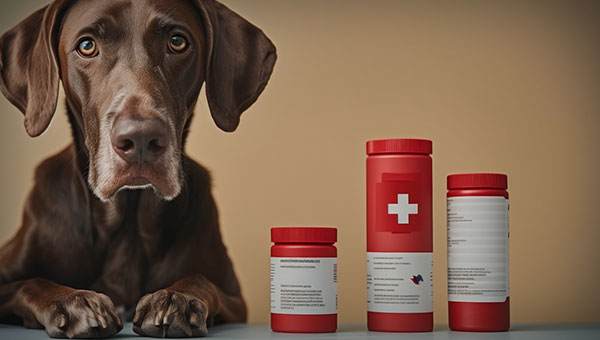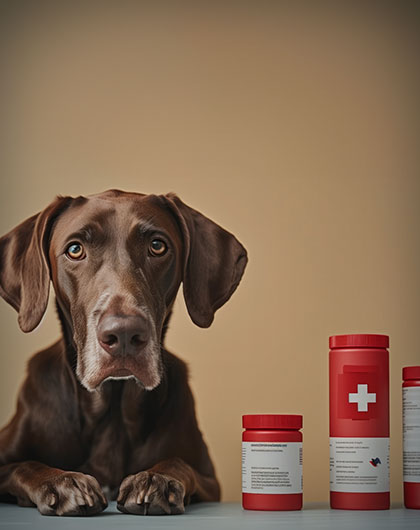
Mold is sneaky, lurking in the shadows of your home, where it quietly thrives in damp and unnoticed corners. It can spread behind walls, in your bathroom, or even in the areas where your pet loves to nap. While mold might seem like just an unsightly problem, it carries significant health risks for your pets. Our furry friends, with their inquisitive noses and a penchant for cozy, out-of-the-way spots, are particularly vulnerable to the effects of mold spores. To safeguard them, it's essential to understand how mold can impact their health and take proactive steps to keep your home safe.
Mold is not simply a cosmetic problem or the odd smell that permeates a room here and there. When mold spores become airborne, they can infiltrate your pet's respiratory system, triggering allergic reactions and serious respiratory issues. They may be more complicated than a sneeze or cough; prolonged exposure may result in a host of chronic diseases.
Dogs are likely to suffer from attacks since they always tend to sniff through every small hole they come across and cats because they like to cuddle themselves up in corners unknown to the rest of the inhabitants of the house. Birds are also not immune to sicknesses that might be attributed to mold, and these can range from respiratory problems or feather picking or even changes in their general demeanor. Knowing these risks helps in managing the problem and reducing the risks your pets are exposed to unknowingly because of mold formation.

Before making efforts to safeguard your pets, you must become a detective in your own home in search of the possible refuge of mold. Mold is known for this normally grows where there is moisture or humidity. These areas could be under the sinks, where the pipe may be constantly dripping, around the windows and window frames where condensation forms, or in the basements where water seepage lasts long.
Another thing is the fact that you can very rarely catch a glimpse of mold since it may grow behind wallpapers or under carpets. However, signs such as a constant smell of dampness, wet patches on the wall, floor, or ceiling, stains, or even mildew, tell you that it is already there. When such signs occur, it is important to get in touch with people such as FDP Mold Remediation among others. They understand the best way to complete this work without putting your life and those of your pets in harm's way since they will worsen the mold situation.
Your dog or cat cannot come and say "Doctor, I am sick"; what they can do is change their behavior. Symptoms of mold exposure differ depending on the level of exposure and your pet's tolerance to it. Coughing and difficult breathing happen to be the most outstanding symptoms, though other symptoms include mere wheezing and sneezing.
If your pet is having breathing difficulties or has a cough that does not go away, there is a high likelihood that mold is the cause. Skin issues are also another sign to look out for since they could indicate that the body needs more support. A mold infestation is generally uncomfortable, therefore making your pet irritated, and scratch more often or develop rashes. It is also important to monitor the subject for signs of abnormal grooming, including licking or chewing at their fur, as these may point to discomfort due to mold exposure.
Mold can also influence the behavior of your pet with symptoms such as irritability and restlessness. Sudden tiredness, not eating or drinking as usual, or sudden irritability might be the underlying signs indicating that there is something wrong with your pet. Knowing these signs ensures they are attended to early to avoid further health issues in the future.
If you are confronted with a mold problem in your house, the worst thing that you should do is panic, but rather, you should consider taking the following steps. In this case, trying to fight the molds on your own is dangerous and the results will not be as effective. Mold production's spores are easily displaced, and they can spread throughout the house, hence posing more danger to the wellbeing of your pets. This is why it's essential to contact professional services like FDP Mold Remediation.
Our mold remediation experts have all the needed tools and proper skills to get rid of the mold from your house. We will determine the affected place, seal off the area and remove the mold. In this way, we can guarantee that your home will be turned into a safe place for the pets again without the dangers that come with doing the corrections yourself.
While the cleanup is happening, it's critical to keep your family and pets away from the affected area. Mold spores can easily be stirred up during remediation, posing an even greater risk to your pets' health. Once our techs have completed our work, you can be confident that the mold has been thoroughly eradicated, and the air quality in your home restored.
The indoor air quality of your house has an effect on the well-being of your pets. Apparently, when mold is washed or otherwise cleared, the spores remain airborne, including in poorly aerated rooms. Experts at FDP Mold Remediation not only physically wipe the forming mold surfaces but also treat the air containing mold spores likely to continue spreading.
To maintain the quality of indoor air, it is advisable to conduct air quality checks after the cleanup process has taken place. To avoid future mold problems, it is advisable to have regular maintenance and Air Quality checks by professionals to ensure that pets are not exposed to the invisible and dangerous effects of mold spores.
If you believe your pet has been in contact with mold and is sick, you should seek help from a veterinarian immediately. It is important to diagnose and treat conditions in their preliminary stage because, otherwise, they can lead to severe complications. Your vet may have to prescribe tests to see if mold is causing your pet's illness and may prescribe antihistamines, steroids, or other medications to bring relief.
In some extreme situations, your pet may require additional care, including oxygen therapy and admission to hospital. You also need to seek advice from your veterinarian on how you can avoid future incidents of mold exposure to your pet. If you think that your beloved pet is sick, do not wait and consult with your vet specialist, as early diagnosis and treatment can save the animal's life.
A mold-free home is one of the factors that need to be considered when ensuring an adequate and healthy environment for your pets. It is also necessary to know their peculiarities and behavior to provide everything that will help them be in good condition. Ensure that your pets get to sleep or crawl in clean, dry areas as well as play on dry surfaces. They, of course, need bathing and trimming and brushing and other things like that, not only for appearance but for hygiene.
Groom your pet often so that it does not develop skin-related conditions that can be caused by molds and other related irritants. Also, pay attention to the makeup of the bedding materials and the toys which your pet takes. Choose the ones that are made from natural fabrics, are breathable, easily washable, and capable of withstanding quick drying. These few measures will be very helpful in avoiding the problems that are related to mold, and also help you keep your pets happy and healthy.
Mold prevention is not a one-time exercise since there is a constant need to ensure that your pets are safe all the time. To avoid mold in your home, it is wise to carry out frequent check-ups and maintenance works. Be in the habit of inspecting parts of your house that you know are usually damp or have poor air circulation and sort out the problem at once.
Prevent mold from setting in to grow out of control, even if this means taking measures before mold is actually noticeable. However, you should do everything possible to make sure that mold does not establish a base in the first place. This may involve minor but crucial duties such as dusting, maintaining your heating, ventilating, and air conditioning system and ensuring that your house is aerated. To sum up, if you keep on being watchful and looking into the possible issues that may occur, then you will be able to properly take care and avoid most of them and make the pets be in a safe mold-free environment.
Your pets depend on you for their basic needs in food, exercise, and protection from harm, among other things. Mold is a silent killer, and the good news is that you can learn how to prevent your pets from falling victim to it. It is very important to be as active and observant as possible in order to prevent mold in one's house.
Keep an eye out for potential problem areas, don't hesitate to call in professional help if needed, and always prioritize your pets' well-being. With these efforts, your pets can enjoy a safe and healthy home, free from the hidden dangers of mold. They may not be able to express their gratitude in words, but their wagging tails, purring contentment, and playful spirits will let you know just how much they appreciate your care and attention.



